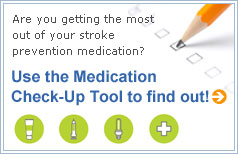
Talking to your doctor
Working with your doctor is an important part of managing your risk of stroke. Be prepared and learn how to talk to your doctor.
Don't Let Silent Stroke Risk Factors Sneak Up on You!
To reduce your risk of a stroke, you need to know your risk factors. Risk factors are things that increase your chances of having a stroke. Some risk factors can be changed and controlled, while others can't. But did you know that some of the biggest controllable risk factors can be "silent" conditions that you often can't see or feel?
Here's how to stop these "silent" risk factors from sneaking up on you:
Get checked for "silent" stroke risk factors.
Some medical conditions greatly increase your stroke risk but may not have any symptoms. Ask your doctor if you need to be checked or treated for any of these:
- Atrial fibrillation is an abnormal heartbeat, also called AFib. AFib increases the risk that a blood clot will form in the heart and move to the brain, causing a stroke. With AFib, the risk of a stroke caused by a blood clot is 3 to 5 times what it would be otherwise. Up to one-third of people with AFib have no symptoms.
- Diabetes damages blood vessels and may increase blood pressure, both of which can increase your risk of a stroke. If you have diabetes, you are twice as likely to have heart disease or a stroke versus someone who doesn't have diabetes. Almost 1 in 5 people are either unaware that they have diabetes or are at high risk of developing diabetes (pre-diabetes).
- High blood pressure damages blood vessels and makes them more likely to clog or burst, causing a stroke. It is the number one controllable risk factor for stroke. High blood pressure usually causes no symptoms, and about 1 in 6 people with high blood pressure have no idea that they have it.
- High cholesterol clogs the blood vessels with fatty deposits, which could block blood flow to the brain and cause a stroke. About 1 in 3 Canadians have high cholesterol, which usually causes no symptoms.
*Please note that the list above does not include all possible medical conditions that may increase the risk of stroke; ask your doctor for more information.
-
Get a treatment plan, including a specific plan to reduce your stroke risk.
Even though you can't see or feel your silent risk factors for stroke, it's very important to control them so that you can reduce your risk of a stroke.
Ask your doctor for a treatment plan, which may include medications and healthy lifestyle changes, to control your medical condition and reduce the risk of a stroke.
Talk to your doctor for a stroke risk assessment and to learn more about your stroke risk reduction options.
Follow your treatment plan and talk to your doctor if you need help.
Your treatment plan will only work if you follow it! Here's what you can do:
- Take your medications as recommended by your doctor.
- Make the healthy lifestyle changes recommended by your doctor. You may need to do this in "baby steps," but remember that every little bit counts!
- Talk to your doctor if you have any questions or concerns about your treatment plan.
Did you find what you were looking for on our website? Please let us know.






